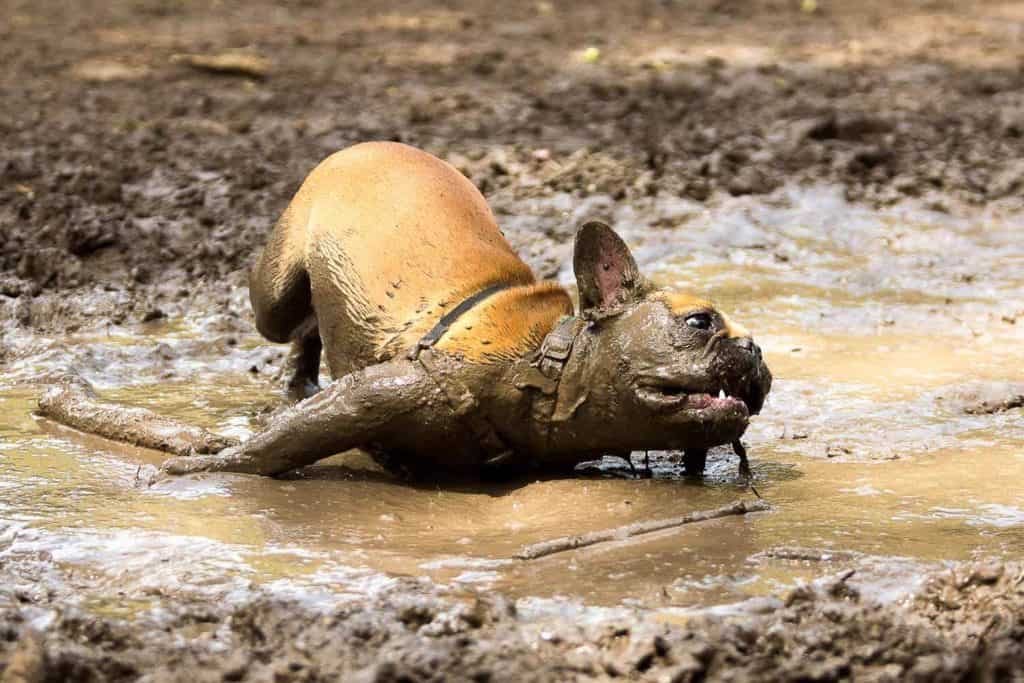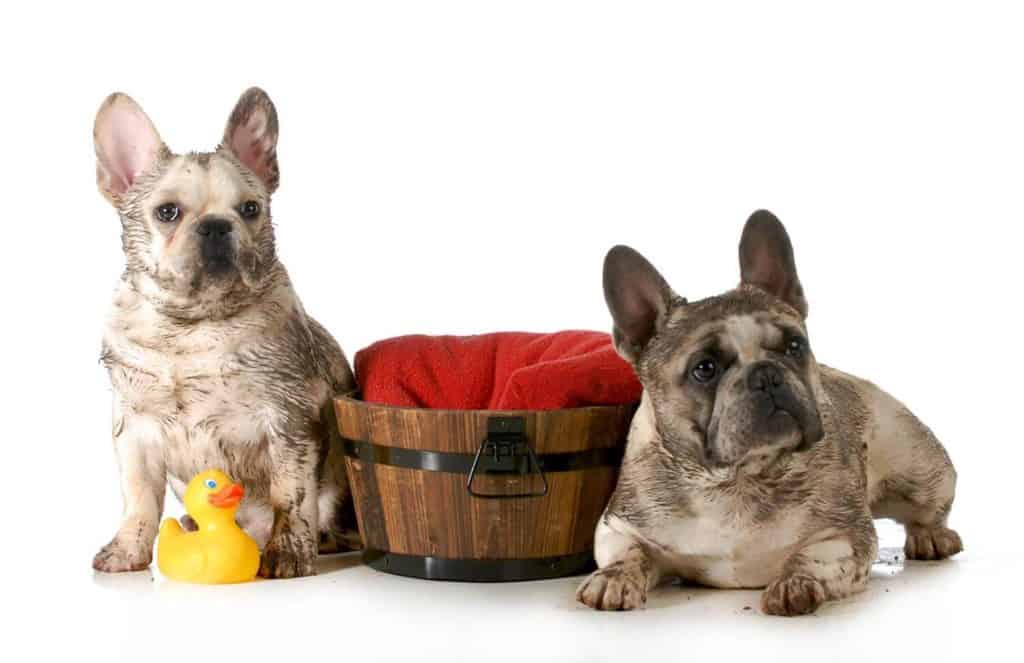
thing, but some breeds have more of a natural odor than others. French Bulldogs can be smelly dogs when compared to other dog breeds, but understanding what makes them smelly as well as how to keep your pooch as odor-free and healthy as possible is as simple as having the right information.
Yes, French Bulldogs do smell and they often will smell more than other dog breeds. These odors can take many forms, including flatulence, stinky breath, smelly skin folds, and even gland-released scents. Frenchies are a stinky dog breed! Besides understanding the source of the odor, you’ll also want to know what the true cause is and how to deal with it to keep your Frenchie fresh.
Why do French Bulldogs smell more than other dogs?
French Bulldogs may not be the smelliest dog breed out there, but they’re certainly smellier than a lot of other dog breeds that you may be considering. A lot of this is simply because Frenchies have more potential causes to create an odor. French Bulldogs can have issues such as skin and ear infections a lot more often than dog breeds. These, along with normal sweat and dental issues can all create a varying degree of dog odor.
Causes for a bad odor in French Bulldogs
For a quick-stop guide on causes of a bad smell in your Frenchie, here are some of the more common issues with Frenchies that will each create a scent. Keep in mind that the worse a condition is, the worse the scent is. The earlier you catch these scents, which are warnings, the easier you can have them treated!
Poor dental hygiene
Just like humans, doggos need to take proper care of their dental hygiene. If he doesn’t get his teeth brushed, he can have infections and rotting teeth that will create bad breath that can be bad enough to cause you to crack a window!
Skin infections
The fact that Frenchies have sensitive skin is certainly an understatement. They have very sensitive skin, especially in those facial and body skin folds. This means that they are especially prone to skin infections. Any time there is a skin infection, his skin can start to smell even if you can’t see the infection at first glance.
Infections with the facial folds or tail pocket
Sure, facial folds are technically the same as body folds, but since French Bulldogs have especially wrinkly faces, facial folds get their own category. There are a lot of causes for infections and sensitivities within the facial folds so they will require careful attention. It’s one of the most common places for a Frenchie to have problems.
Tail pockets are also hot spots for infections due to the ease they have in gathering debris and moisture (much the same as facial folds). Also thought to be one of the most common places for Frenchies to have a problem, these both can create quite a smell.
Ear infections
While they may often be a little easier to detect in Frenchies than an infection in the skin folds, an ear infection will also give off an odor. This often isn’t as strong as a skin infection, but it can be hard to differentiate from issues with the skin and/or the mouth (more on that in the next section).
Allergies or immune system issues
Frenchies have notoriously sensitive immune systems and this is often accompanied by allergies related to food. If a Frenchie is allergic to his food, you may notice that he is farting more than usual. You’ll also find that he has gland-related scents (usually from his anal glands). This could also be an allergic reaction with his skincare products, though, so you’ll want to make sure you get to the bottom of the scent by factoring in any allergies.
Most susceptible French Bulldog parts to get smelly
That all make sense, of course, but how can you figure out what the problem is when there are so many to choose from? More importantly, if your whole Frenchie seems smelly, how do you know it’s not all of these areas rather than one? The best way to figure out what the problem is causing the odor in your Frenchie is the sniff test.
His tush
While it’s certainly not any dog parent’s favourite spot to do the sniffing, you’ll want to give his adorable wrinkly tush a sniff or two to see if the odor is stronger there. If it is, you could be dealing with a dog that has nasty flatulence (likely caused by a digestive-related issue) or secretions from the anal glands which are often linked to diet. If those don’t seem to be the cause, you’ll most likely find it’s an issue with his tail pocket.
His mouth
Your Frenchie’s snuffly head takes up a lot of real estate both in terms of size but also odor sources. The most likely cause of an odor, particularly if you notice it when he’s panting, is bad breath due to dental hygiene or potentially diet issues. If you notice that he still has a distinct, head-focused scent even with his mouth closed, it could be due to an infection in his many facial folds. If those are clear, check his ears for an infection there.
His wrinkly body
Skin infections are the most likely cause for an odor if you notice it just in the general area of his back or even his belly or neck. However, if you don’t see any obvious signs of an infection after a thorough check, you’ll want to consider that it could be from self-grooming. If you notice that your Frenchie’s paws as well as the fur all over his back and forelegs, as well as his sides all seem to reek evenly, it’s a good chance that it’s due to him self-grooming and spreading the scent with his tongue.
How to stop a French Bulldog from smelling

Feeling overwhelmed by all of this? There are plenty of ways that you can help prevent an odor in your Frenchie (as well as treat an odor after it starts) so that you don’t feel like you’re simply losing a never-ending battle. Here are some real tips to help you keep your Frenchie from having issues in the first place.
Proper bathing and grooming
Proper care of your Frenchie includes grooming and bathing regularly. If you keep on top of that for your Frenchie’s skin paying particular attention to his skin folds, tail pocket, ears (including inside) and even his teeth, he’ll be much happier and door-free. After all, unwashed humans can create a lot of natural scents, so wouldn’t it make sense for an unwashed doggo to be the same?
Regular changing and washing of bedding
To prevent skin irritations as well as a scent on his body from when he lies down in his bed for a snooze, you’ll also want to get used to washing and changing his bedding regularly. Not only will this create a fresh and enjoyable space for your spoiled pooch, but it will also keep your house from “smelling like dog”. To help make this easier, simply throw your pooch’s bedding in the wash whenever you put your bedding in!
A healthy and balanced diet
A healthy gut is also great for helping your dog regulate his body as well as its scents. Just like eating junk food and being a total couch potato would create smell-related issues in humans, doggos must also eat a healthy selective diet and get the right amount of exercise.
Proper vet check-ups and courses of treatment
Annual trips to the vet will help your doggo stay healthy and in the know about any potential issues before they happen. Also, if you take your dog to the vet when you notice the first signs of an infection or even a bad smell that you can’t identify, your vet will be able to get on top of it quickly with antibiotics and/or steroids.
Even though a simple skin or yeast infection in facial folds doesn’t seem like a big deal (albeit, smelly), it can quickly build into a bigger problem for your pooch and can be very stubborn and serious, requiring lots of medical treatment.
Conclusion
From one cause to another, Frenchies are a rather…fragrant breed. Helping them keep their natural scents to a minimum focuses on proper hygiene, a great diet, and proper check-ups on his entire wrinkly body. Keep these hot spot areas in mind the next time that you notice your pooch being accompanied by a scent that you don’t recognize. Both he and your entire household will thank you for it!
